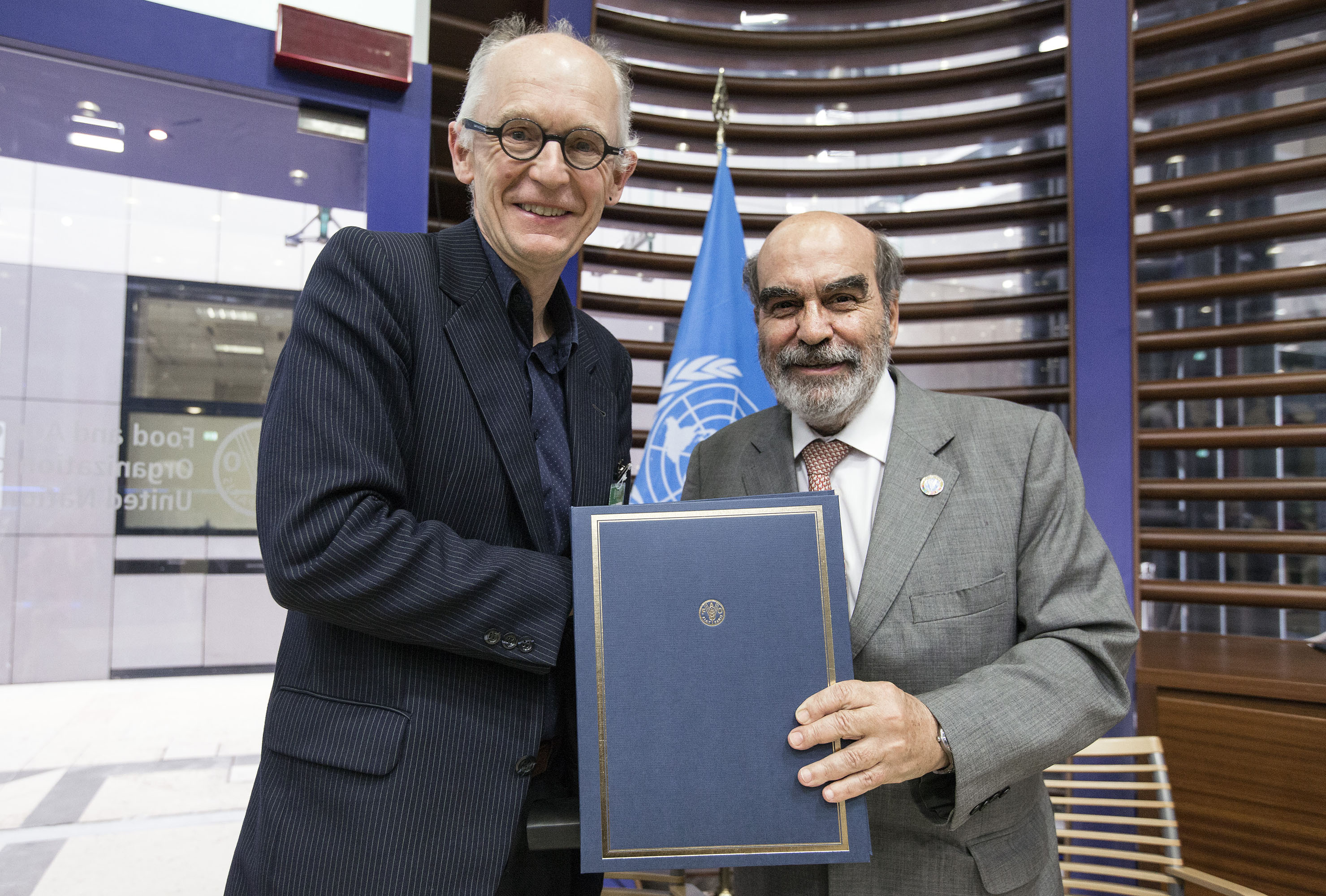
July 15, 2019, by Lindsay Brooke
Nottingham and UN join forces in the fight against world hunger and poverty
Healthier diets and sustainable consumption are two of the key objectives set out by the University of Nottingham as it joined forces with the Food and Agriculture Organisation (FAO) of the United Nations in the fight against world hunger and poverty.
The two organisations have signed a Memorandum of Understanding (MOU) with the aim of improving the design and implementation of policies aimed at generating evidence to improve the lives of people living in the most vulnerable populations.
What’s on the list?
- Governance and design of an urban food agenda
- Speed up the commercialisation of healthy foods
- Introduce good practice for sustainable, nutritional agriculture
- Develop diagnostics and studies to promote access to healthy food and eating in urban populations
- Research into nutritional solutions to non-communicable diseases caused by malnutrition
- Design policies for safe food and food security
- Establish dialogues with the private sector around healthy and sustainable foods.
The signing took place during the international symposium on the Future of Food attended by world-leaders and experts in nutrition, global and public health, food policy, food manufacture and gastronomy
The work here at the University of Nottingham will be carried out by experts in the Future Food Beacon – a £16m transdisciplinary open research platform. The Beacon is led by David Salt, Professor of Genome Enabled Biology who was invited to speak at the symposium and participate in the signing of the MOU with Jose Graziano da Silva the FAO Director General.
He said:“The challenge to the future of food is not only to produce more food, but to ensure equitable access to healthy and nutritious foods that are produced in a sustainable way. To achieve these goals will require a greater understanding of both global and local food systems. The Future Food Beacon and the FAO have the same comitment around these strategic goals. The partnership with the FAO is based in a multidimentional food systems appraoch to delivering nutritious, healthy and sustainable foods for all”.
The challenges ahead
Food-systems scale thinking is an approach that requires the integration of knowledge across all aspects of our food system from soils, primary production (both crops and livestock), food manufacture, nutrition and health, supply chains, laws and policy, through to histories and cultures. Without such an integrated view the development of equitable and sustainable food systems that deliver healthy and nutrious food appropriate for the local and regional context will be impossible. To achieve such food-system scale thinking requires the coupling of globally accessible research-based knowledge generated by universities and other places of learning, with local knowledge develop by practioners that is rooted to place and passed on through culture, practice and histories.
Leading the charge is Dr Tereza Campello, a former Government Minister of Social Development and Fight Against Hunger in Brazil. She is a visting Senior Future Food Fellow in the Future Food Beacon at the University of Nottingham, and is also associated with the Centre for Research in Race and Rights. She said: “In the current world, hunger affects more than 820 million people and obesity has become an epidemic that will quickly exceed this threshold (more than 670 million adults are obese worldwide). We are joining efforts between scientific knowledge and FAO’s capacity to address these issues. But it will only work if we work together with governments and society. The MoU has this perspective.”
The size of the task
The work will initially focus on Latin America and Caribbean, especially Brazil, Bolívia and Paraguay, and potentially Guatemala and Honduras. The partnership with FAO will start imediately through the Food Deserts Project, that will be dedicated to study those areas in cities where communities have limited or no access to healthy foods, an issue that disproportionately impacts the wellbeing of low-income families. The mapping and modelling of these food deserts, which until recently have been overlooked by researchers, is a way to support interventions to improve access, which is the primary goal of this project.The team will be analysing household incomes and spending on food, and talking to large supermarket chains to understand how consumer behaviour is influenced. The research team will also be looking at food labelling, and advertising restrictions on foods with high sodium, fat and sugar content that are marketed to children.
They will be developing, promoting and strengthening joint actions, interventions and projects through workshops and meetings with stakeholders.
Dr Richard Masterman, Associate Pro-Vice Chancellor for Research Strategy, said: “Collaborations between international organisations like the Food and Agricultural Organisation of the United Nations and universities are a key aspect in finding solutions to the global challenge of hunger. This new collaboration between FAO and the Future Food Beacon recognises the need for an transdisciplinary response drawing together expertise across the food system.
“Professor David Salt and his colleagues are building networks that cross borders, and are committed to delivering evidence-led, in-country solutions across complex cultural, political and societal landscapes. Our partnership with the FAO will inform Future Food’s work and further our vision of access to nutritious food for all.”
No comments yet, fill out a comment to be the first

Leave a Reply